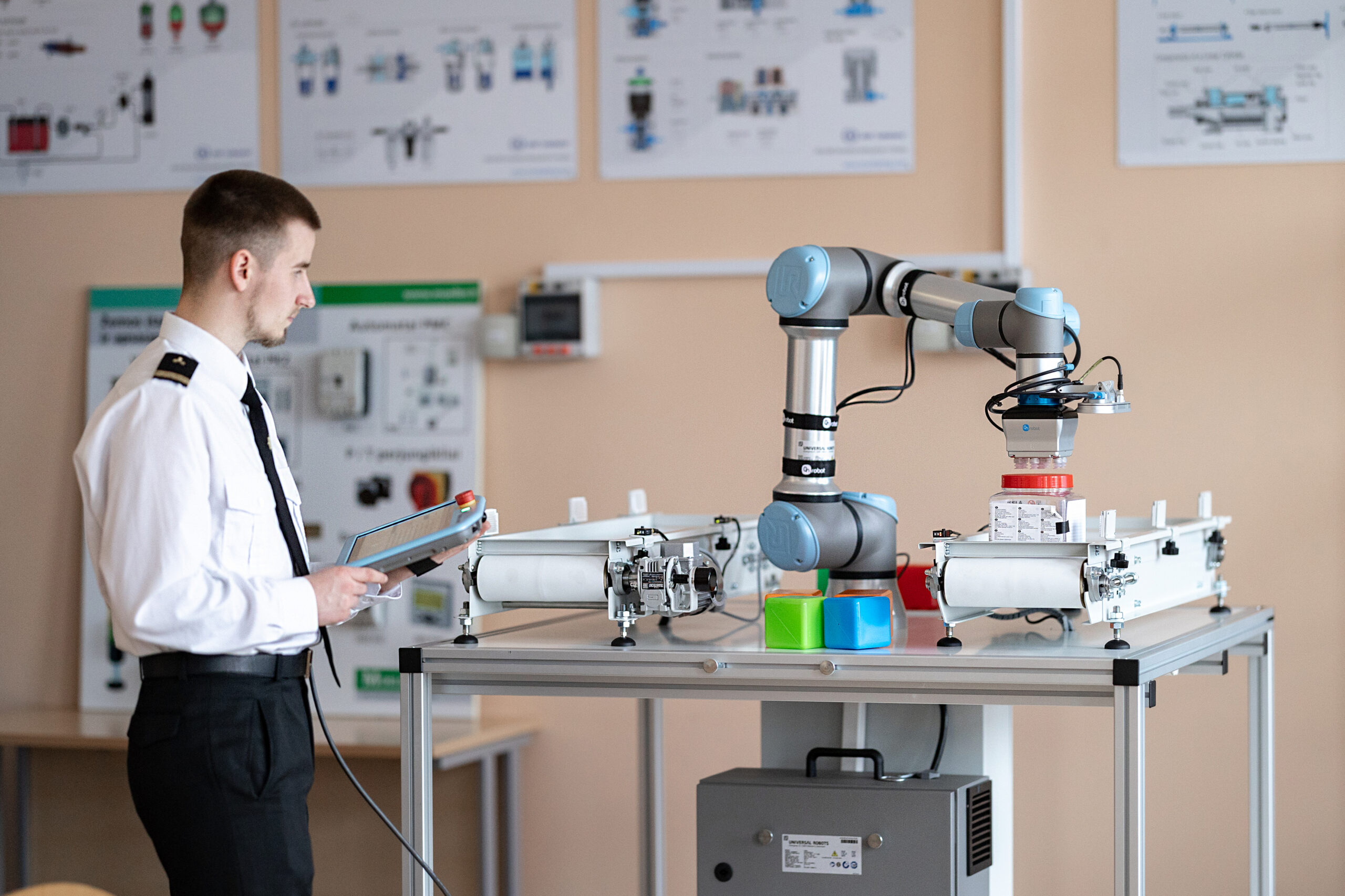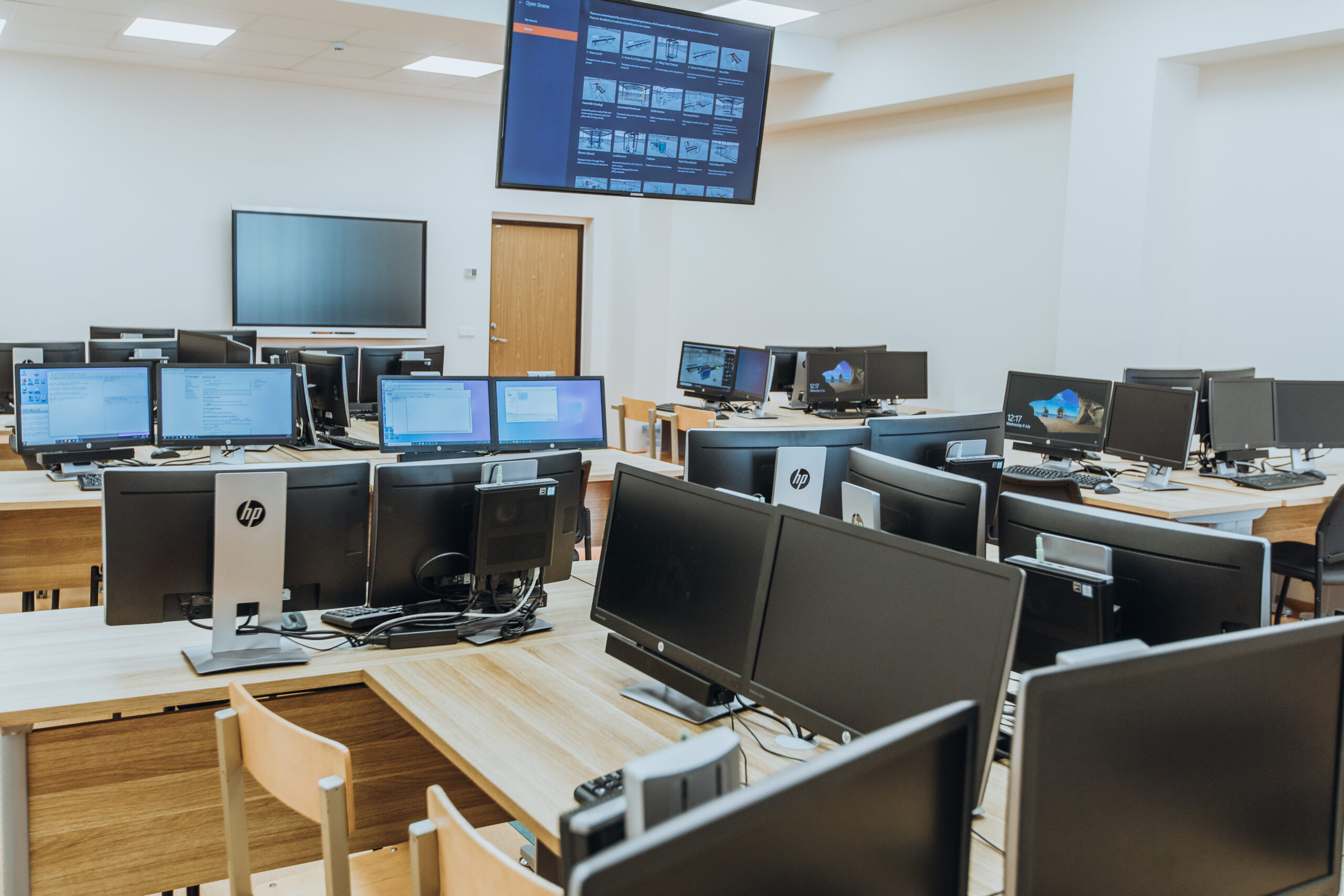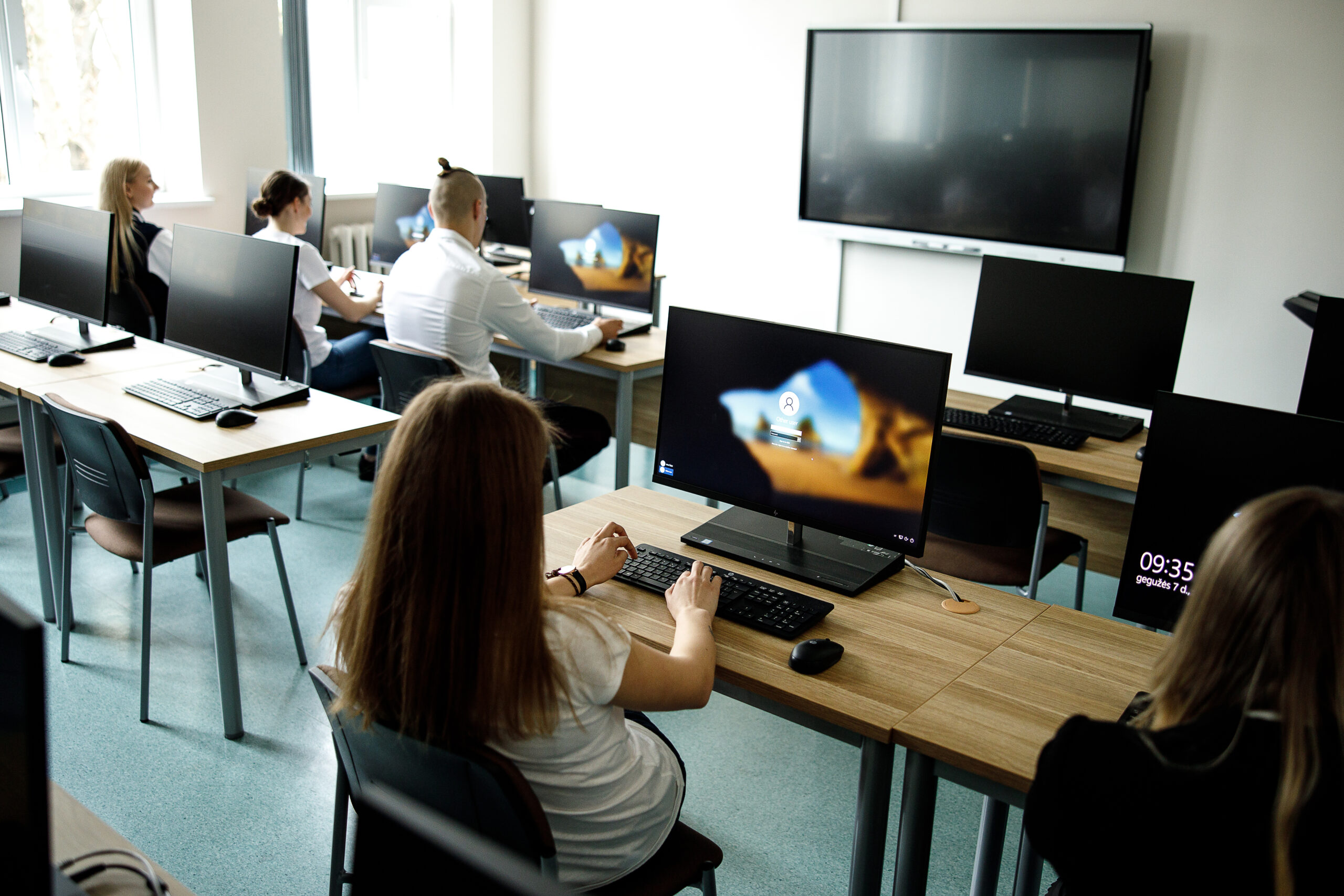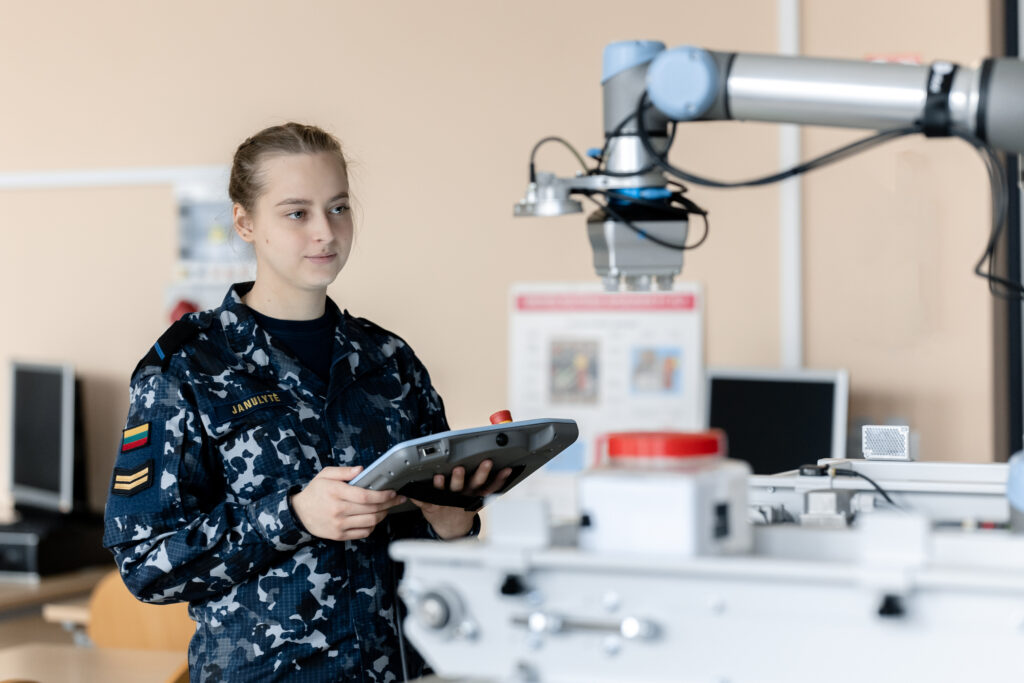
FOR QUESTIONS REGARDING STUDY PROGRAMMES, PLEASE CONTACT:
Room: 114
Phone: +370 46 397 255
Mobile Phone: +370 692 83 739
Department of Port Engineering Vilma Locaitienė
E-mail: vilma.locaitiene@vilniustech.lt
Room: 114
Phone: +370 46 397 255
Mobile Phone: +370 692 83 739
Administrator Asta Raudienė
E-mail: asta.raudiene@vilniustech.lt
a
“Technology of Maritime Transport Logistics” is the only study programme in Lithuania that provides knowledge and skills about the technological processes of logistics companies, as well as sea/inland ships and seaports, including:
– Technological analysis of seaport terminals according to cargo types, handling techniques, and environmental aspects;
– Maritime transport analysis according to ship types, routes, and safety aspects;
– Analysis of logistics processes, including optimization of supply chains, storage, and delivery of goods;
– The use of technology in the field of logistics, applied systems of transport management, and data analysis tools.
This study programme is useful for those who want to work in maritime transport, logistics companies, transport companies, ports or other related companies of the industry. It may also be useful for those interested in international trade, logistics chain management, or maritime economics.
STUDY PROGRAMME SPECIALIZATIONS
Logistics of Maritime Transport
Customs Procedures
More information in the AIKOS
Duration of studies
(Full-time studies)
Duration of studies
(Part-time studies) in Lithuanian language only
Duration of internship
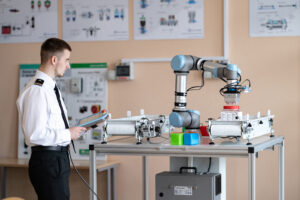
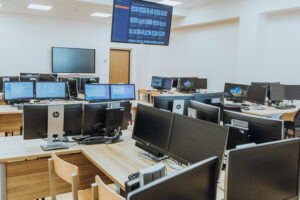

The lecturers are researchers and scientists in the field of marine technology, and professional in the field of shipping, seaport technologies, international logistics, port management and maritime economics, who base their knowledge on the experience of professional activities in port companies.
CAREER
The professional bachelor’s degree in technology science obtained at the Lithuanian Maritime Academy provides opportunities to work in both Lithuanian and international logistics companies in organizing and carrying out activities of management and operation of logistics processes and the equipment and technology required for them. There are approximately 23,000 jobs related to the activities of the maritime transport sector in Klaipėda. These jobs have been created by the Klaipėda State Seaport and the companies operating in it.
After completing the study programme of the technology of maritime transport logistics, the acquired education according to the Lithuanian profession classifier provides opportunities to apply to the following job positions:
- Technology and production engineers and technologists (2141);
- Production managers (1321): operation, production manager, chief technologist, managers of supply, distribution and similar services. (Read more)
Graduates of the technology of maritime transport logistics study programme work in positions such as technical and/or production director, project manager, stevedore, loading manager, technical director, logistics technologist, logistics process coordinator, technologist, logistician, transport manager in companies of maritime transport industry operating in the port, at customs posts, navy, Lithuanian Transport Safety Administration, and Klaipėda State Seaport Authority.
According to the data of Karjera.lt portal, LMA technology field graduates who are employed in their field have one of the highest average salaries in Lithuania in 2018.
GOAL OF THE STUDY PROGRAMME
Train maritime transport logistics technology specialists are able to design and manage processes of technology of maritime transport logistics and independently prepare and implement logistics projects for sea freight transport in the global market. They apply modern advanced sea and land freight transport technologies, using them in conjunction with technologies of sea port and sea and land transport, information and communication technologies, freight forwarding and storage processes, based on the results of research on cargo flows, cargo transportation routes, vehicles and other important elements of the cargo transportation process. They implement the principles of logistics timeliness, security, efficiency, intermodality, and internationality, in accordance with national and international general and maritime legislation, International Maritime Organization conventions, quality standards, port and shipping safety, environmental protection requirements. They are capable of working individually and in a team, organizing their own work, planning their own time and constantly developing their own professionalism and general knowledge.
INTERNSHIP
INTERNSHIP OF TECHNOLOGY OF MARITIME TRANSPORT LOGISTICS IS DONE IN THE 1ST AND THE 3RD YEAR
Introductory internship of sea transport and port technology is done in the 1st year;
Graduation professional internship is done in the 3rd year, according to the chosen specialization:
Specialization ‘Logistics of Maritime Transport’ – graduation professional internship of technology of logistics of maritime transport or intermodal transport (per student’s choice).
Specialization ‘Customs procedures’ – graduation professional internship of customs procedures/sea transport/cargo/technical inspection.
The duration of the internship of the technology of maritime transport logistics study programme is 4 months. Place of the internship of the technology of maritime transport logistics: shipping, maritime cargo, maritime industry logistics, transport, cargo freight forwarding, ship and shipping line agency, or other maritime industry companies of related activities, or companies related to the activities of this industry. Many places for internship can be found in the online company database of Klaipėda State Seaport.
WHY CHOOSE THIS STUDY PROGRAMME?
This is the only study programme in the country covering the technology of maritime transport logistics. It studies the global supply chain in the broadest sense and with a strong focus on the maritime transport and seaport chain – because about 90 percent of the global international trade is conducted by sea. Such studies give students the opportunity to study in all higher education institutions that offer logistics studies, and also in maritime academies.
– Studies of maritime technology and the competences of the future specialist are based on the operational needs of the international maritime transport industry and the latest maritime technologies, regulated by the conventions of the International Maritime Organization; therefore, the structure of the study programme and study subjects are similar to the programmes offered in foreign maritime academies.
– There are traditional engaging lectures, seminars, discussions, analysis of scientific and professional literature. Critical thinking is developed and lectures are designed to support integrated teaching of subject content and foreign language, as well as content analysis of international legislation regulating the maritime transport sector and business.
– Students perform research work, prepare applied research publications and presentations at national and international conferences, participate in lessons based on problem and case
analysis, develop business planning projects, work in small and large groups, discuss and reflect, as well as engage in creative writing, consulting, independent work, etc.
– Practical training of the programme ‘Ensuring the safety of people and ship viability (STCW A-VI/1)’ takes place in the pool of the LMA Seafarers’ Training Center with lifeboats and a simulator of a helicopter lift, as well as in the laboratories of firefighting and first aid.
– Typically, interns are employed by seaport or other companies during their professional internship, and receive a salary from their employer.
ENVIRONMENT OF STUDIES
Studies take place in a modern environment that meets international requirements. Students can use a modern library rich with the latest scientific and informational publications, and also have access to the internal digital teaching/learning environment and digital resources of the academy.
Specialized computer programs and electronic simulators that simulate real information systems operating in Klaipėda and other seaports are intensively used during training internships and subject studies, so students do not have any difficulties in practice or commencing their work.
LMA is equipped with sports halls and gyms, which are intended for optional sports, physical education classes, sports competitions, sports and other events in which students of all study programmes participate. They can also spend their free time in these facilities.
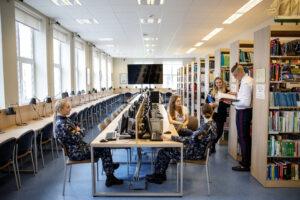
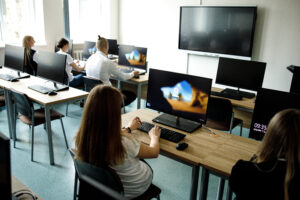
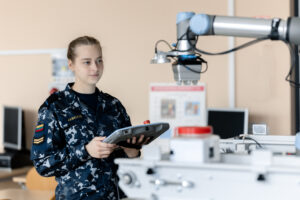
SUBJECTS OF STUDY PROGRAMME
| 1st SEMESTER | CREDITS (ECTS) |
|---|---|
| Applied Mathematics | 10 |
| Introduction to Maritime Transport Logistics | 10 |
| Logistics Information Technology | 10 |
| Physical Education (Rowing) | – |
| 2nd SEMESTER | CREDITS (ECTS) |
|---|---|
| Second Foreign Language (Spanish, Russian) A1, A2 | 5 |
| Basics of Mechatronics | 5 |
| Basics of Maritime Technology | 10 |
| Civil and Occupational Safety at the Port | 5 |
| Introductory Internship of Sea Transport and Port Technology | 5 |
| Physical Education (Rowing) Afika | – |
| 3rd SEMESTER | CREDITS (ECTS) |
|---|---|
| Maritime English | 5 |
| Marine Environmental Protection | 5 |
| Technology of Maritime Cargo Logistics | 10 |
| Specialization: Customs Procedures Cargo Control at the Port | 10 |
| Specialization ‘Logistics of Maritime Transport’ Technology of Maritime Transport | 10 |
| Optional Subjects of Specializations – Land Transport Systems – Technology of Vehicle Operation – Intermodality of Transport Systems | 10 |
| 4th SEMESTER | CREDITS (ECTS) |
|---|---|
| Specialization: Customs Procedures Basics of Customs Activity | 10 |
| Specialization: Customs Procedures International Supply Chain and Customs Inspection | 10 |
| Specialization ‘Logistics of Maritime Transport’ Technology of Warehousing and Stock Logistics | 10 |
| Specialization ‘Logistics of Maritime Transport’ Modelling of International Supply Chain | 10 |
| Maritime Business Management, Economy, and Legal Grounds for Activity Optional subjects of the module: Basics of Management (3 credits); Business Management (3 credits); Basics of Port and Shipping Management (3 credits) Theory of Economics (4 credits); Business Economics (4 credits); Maritime Economics (4 credits); Basics of Law (3 credits); Transport Law (3 credits); Commercial Maritime Law (3 credits) | 10 |
| 5th SEMESTER | CREDITS (ECTS) |
|---|---|
| Methodology of Technology Applied Research and Projects | 10 |
| Optional subjects: – Mentality of Sustainable Logistics; – Culture of Business Harmony; – Philosophy; – Western European Cultures; – Basics of Political Science, – Professional Career Planning | 5 |
| Thesis of the Professional Bachelor (Part 1) | 5 |
| Specialization: Customs Procedures Training Internship of Customs Information Systems | 10 |
| Specialization ‘Logistics of Maritime Transport’ Training Internship of Maritime Transport Logistics Information Systems | 10 |
| 6th SEMESTER | CREDITS (ECTS) |
|---|---|
| Specialization: Customs Procedures Graduation professional internship of customs procedures/ sea transport/cargo/technical inspection. | 25 |
| Specialization: Logistics of Maritime Transport Graduation professional internship of Sea /Intermodal transport logistics technologies | 25 |
| Thesis of the Professional Bachelor (Part 2) | 5 |
ADVANTAGES OF STUDIES IN LITHUANIAN MARITIME ACADEMY:
• Student leisure area
• Higher education high quality studies in Europe
• Worldwide benchmarked marine and onshore study programmes
• Prestige and quality
• Study mobility in more than 60 higher education institutions and Partners in Europe in frame of Erasmus+ programme
• Training using modern simulators
• Studies and practice in strong cooperation with maritime industry
• The uniqueness of studies is links with global maritime industry – guest Lecturers are invited from various port companies, field trips are organised
• Research and practice are provided




